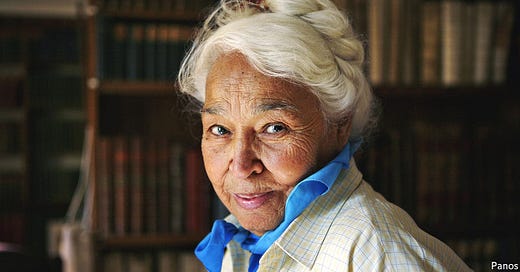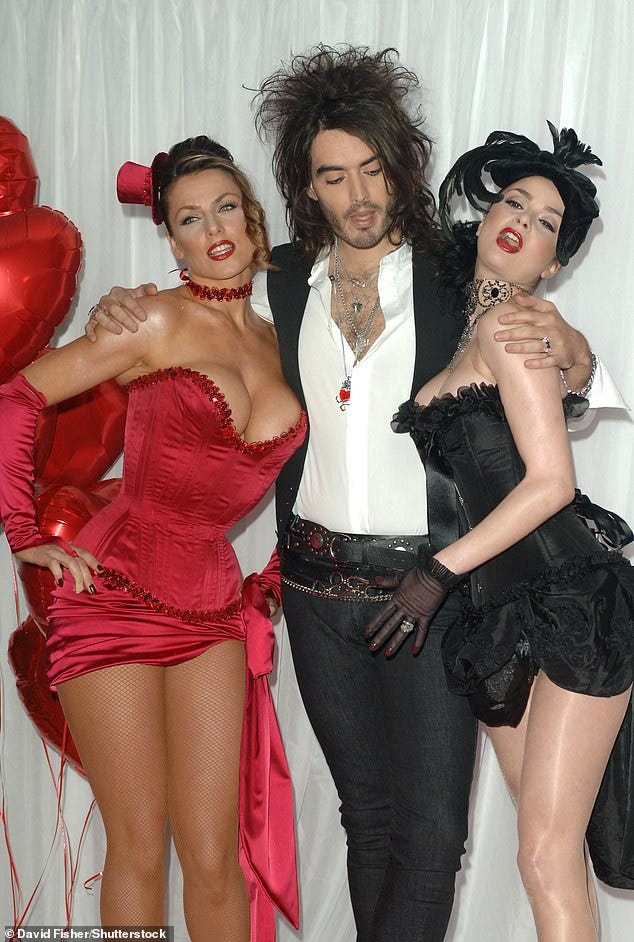“Grant the annihilation of my dark, carnal self.”
- The Speech of the Birds, Farīdu’d-Dīn ‘Attār
I want to turn my attention back toward artificial intelligence and other exponential technologies — I’m currently reading The Coming Wave by Deep Mind founder Mustafa Suleyman, learning about the ongoing convergence of AI and synthetic biology which is both fascinating and overwhelming — but I keep reflecting on the Russell Brand situation and what it reveals of the ongoing trajectory of #metoo / cancel culture, as well as the contemporary dynamics of male/female relationships. As a thinker, my tendency is to explore how various seemingly disparate topics intersect and relate to each other. I feel drawn to attempt that here. But what I don’t have are definitive answers, and my feelings and ideas keep moving around…
Please consider this an essay in the original meaning of the word, which is “to try.” “To try” also means, in many cases, “to fail.” (As Samuel Beckett put it: “Try. Fail. Try again. Fail better.”)
One woman acquaintance wrote me an aggrieved letter after my first piece on Brand, where, I admit, I didn’t foreground the pain and suffering of the woman who may have been harmed by Brand’s alleged abuses as much as I perhaps should have. She ended her letter (asking that I not respond to her about it): “I'm writing this because I found myself reading your defense of a rapist. Women really are fed up of having to speak out like this, to men like you. I do hope in your work in engaging with spirituality and speaking truth to power you'll discover the true key to this conjecture: it's called feminism.”
I felt stung by this — but also surprised (and not surprised) she would refuse to have any dialogue with me about it. For many people in the progressive / Left-learning and feminist mainstream, aggressive or abusive male sexual behavior (even when committed many years ago, in a different cultural context with now-obsolete societal norms) is now considered an Absolute. It is also telling that the Times reporting was — for this woman and many other Left-leaning progressives — enough to find Brand guilty of rape, without any need for a presumption of innocence or any form of due process (after all: “#believewomen”). Everything is seen as entirely black or white, with no possibility of nuance, or any involvement of female agency.
My last two pieces about Brand stirred up many great comments from readers. This one, from Andy Laken, stayed with me:
'Keeping secrets private and holding back emotion are psychic misdemeanors for which nature visits us with sickness. But when secrets are told and emotions expressed in communion with others, they satisfy nature and may even count as useful virtues...There appears to be a conscience in humankind that severely punishes everyone who does not somehow and sometime, at whatever cost in personal pride, confess fallibility. Until one can do this, an impenetrable will shuts one off from the vital feeling of being fully human. This explains the extraordinary significance of genuine, straightforward confession — a truth that was probably known to all initiation rites and mystery cults of the ancient world. There is a saying among Greek mysteries, "Give up what you have, and you will receive.”' - Carl Jung
[This Jung quote was part of] the High Holidays Machzor I read from at Yom Kippur services Sunday night. There’s some synchronicity that is unfolding during our deep season of surfacing that within us which needs to ask forgiveness, and forgive.
In contrast to many of the commenters here, as I read your message to Russell, it’s not about right or left, necessarily believing all the accusations, or getting leveraged as part of the supposed apparatus to silence him for being a truth-teller. As I see it, you’re seeing someone you care about (and who can potentially make a difference) in a crucible, and you're perceiving the psychic cost to him that may accrue if he does not make some accounting and teshuvah (atonement/turning/returning). To whatever extent the recently reported claims are true or not, I have little doubt that with the level of hypersexuality and other addictions in his past he has recounted, some harm was caused to some partners. We tend to know in our hearts whom we have harmed. Many men can relate to this I think.
I appreciate your perspective that addressing the male/female divide/dynamic (not being gender essentialist, speaking on an essence level) is crucial for healing our polarization. That’s rarely spoken about these days. #metoo has been a double-edged sword. A blessing because millennia of oppression are finally being exposed and expressed. A very deep psychic wound to our species is being opened and beginning to be cleansed. And as when any such deep well of pain is brought to the surface (individually or collectively), it’s very messy and doesn’t always show up in a ‘fair and prudent’ way. It’s understandable that in such a dynamic there will be a temporary loss of nuance and focus on ‘due process’ while generations of pain and oppression are uncovered – pain and rage must have their voice. This is a centuries-old generational / societal trauma experienced by half of our human family.
Unfortunately, in our current moment we have all the apparatus of the outrage machine fueled by social media and the phenomenon of ‘cancelling’. Cancelling is the mirror image of the sociopathic refusal or inability to ever accept any responsibility or accountability, or to ever apologize or express regret, that we see in Trump – and that has become a kind of template across the board. In this attitude, ‘confessing fallibility’ (to use Jung’s formulation) is not only a sign of weakness, it would be tantamount to the destruction of one’s self-concept. So we’re in a paradox – in a time when we most need the healing and wisdom of (when we are ready) truly expressing regret for harms caused, a dominant template tells men to never confess fallibility, on pain of self-destruction.
And I suspect that those who crave the sugar-high of cancelling someone who has caused harm know deep-down that it doesn’t provide them with the resolution they seek. Murder victims’ family members often speak of how they thought the death penalty of the offender would finally give them some peace, but it usually doesn’t. There’s something in us that is called to a deeper kind of reconciliation where there has been hurt, that simply killing, erasing, or cancelling the one who has harmed can never accomplish. I believe this is embedded in the restorative justice concept (https://ejusa.org/what-is-justice/), and in the Truth and Reconciliation model you’ve referred to.
So in the mainstream culture we’re being offered two choices: 1) take up pitchforks and cancel/kill/deplatform the person or 2) Defend them adamantly, never admit fault or weakness. This is a recipe for never achieving true healing and reconciliation. We need to reject this impoverished dichotomy and explore ways that allow nuance, vulnerability, confession, and forgiveness.
I believe that many men who have the self-awareness and willingness to engage in a dialogue around accountability and forgiveness find the current options unpalatable and so are just staying mum. What will be the tipping point that helps us again find ways to seek and grant forgiveness in the true spirit of reconciliation?
Rather than trying to address this directly, I am going to consider other responses to the Brand reveal, and related themes that I keep exploring / feeling into. One thing worth considering is the political implications of this incapacity to forgive (for aggrieved victims and their ecosystem of supporters) or to admit and atone (at risk of financial and career destruction) for past bad behavior. If men feel their survival depends on anti-woke/anti-cancellation policies, they will move toward Right Wing or reactionary politics, as Brand has done.
I am generally an admirer of Jules Evans’ Ecstatic Integration newsletter. But I found his recent essay, “Eye-Gazing and Spiritual Pick-up Artistry” to be bizarre. He embeds a Youtube montage of Brand flirting with various women on television shows, bemoaning “the fact that we the audience indulged and applauded Brand’s behavior as a manipulative pick-up artist.” He then goes on a tirade against men using “deep eye-gazing” as a seduction technique on the transformational festival circuit, writing: “A generation of spiritual fuck-boys has been raised on eye-gazing techniques to cultivate the surface appearance of spiritual depth and authenticity, as a means to gratify their desires. We are mistaking phony intimacy for actual integrity.” (By “we” I suppose he means the poor, defenseless young women who he wants to forewarn and protect from these apprentice Svengali’s).
While I enjoyed Evans’ characterization of overgrown “flow boys,” I also think, innately, men want to connect with women, and vice versa. Women are more receptive by nature, and men are almost invariably the ones who have to make the often embarrassing or even humiliating “first moves.”
Keep reading with a 7-day free trial
Subscribe to Liminal News With Daniel Pinchbeck to keep reading this post and get 7 days of free access to the full post archives.






